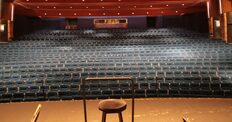 I’m embarrassed to admit it, but I’m not a regular concert goer. It’s partly because I’ve come to understand and enjoy the concert experience from the stage rather than the audience, and also that I’ve become so particular about my listening experiences I don’t want to be trapped at a concert that I’m not enjoying. But when I do make it out to a concert, it ofte feels like a religious experience. The concert hall is my sacred space, music is my sacred text, and the audience around me are my fellow congregants. It’s an involved, sometimes exhausting, and deeply meaningful ordeal, and in the last few weeks of being ordered to stay-at-home, I’ve come to miss it a great deal. There is no lack of new online music content suddenly making itself available on the internet, but this online content lacks something vital to the concert experience: it does not require me to set aside my time and attention and devote myself to fully submerging into the performance. I listen to this music casually, while scrolling through social media, or watching it on a second screen while occupied with other work. Even in quarantine, 21st Century lives are busy, filled with back-to-back commitments and hundreds of tiny distractions pulling for our attention. Sometimes you have to fit art and entertainment in the cracks.
While I’m consuming the musical content of these new offerings, I’ve come to realize that I’m missing half the point of the concert experience, and if you’ve been consuming this new content in the same way as I have, you might be missing it too. In her book What is Art For? Ellen Dissanayake views art as the product of “making things special”, setting a thing above the ordinary, elevating it with value and meaning. Our concert halls are temples to music. During a concert we are expected to sit quietly, put our distractions away, and turn our attention to something abstract and beautiful. All of this readily available content I can watch at all hours of the days makes it that much easier to engage casually and not make room for the deep, transformative experience art can offer to us. As the world-famous violinist Joshua Bell discovered, even the highest level of performance will be ignored if not approached with an appropriate level of attention and reverence. Art, it turns out, needs a frame. The solution that I’ve come to, perhaps counter-intuitively, is to create a “frame” around concerts by making them less accessible. I’ll give an example: I recently participated in an online concert of new music that was presented as a “live” stream event. Performers pre-recorded their sets individually at their homes and sent them to the main organizer who stitched them together into a concert experience replete with breaks to get refreshments, and even a post-show reception via zoom. The music didn’t happen live, but the event itself was scheduled to start exactly at 6:30pm. The night of the online concert, my wife and I rushed to get to the show on time making sure dinner was finished, drinks poured, and snacks at hand. We dimmed the lights, got comfortable, and waited for the show to start knowing our friends and colleagues were doing the same. We saw our community gathered in the chat window excitedly encouraging each other as the show began. After the show aired, it stayed online. We could conceivably watch it later, but we don’t; I know that moment of experiencing it with an audience has passed. It’s the same kind of social pressure to stay current and relevant in real time that had kept me watching Game of Thrones every week when a new episode was released. Sure, I could catch it later in the week but I’d miss out on the shared cultural moment, even if it is experienced remotely and individually from my living room. Such timeliness is an integral part of putting a frame of ‘specialness’ around an event. Upending that frame changes the nature of the event dramatically. The experience showed me a model for how to maintain a sense of ‘specialness’ around the concert experience in a remote environment, and it illuminated some of what makes the experience of concert-going special in the first place: a shared social experience and a ‘frame’ of time where we dedicate out attention towards the sublime. The next time you have an opportunity to stream a concert, and to those who organizing such events, consider the set and setting. Knowing an experience is timely and ephemeral encourages me to treat it differently, approaching it with a presence of mind and a level of intention that keep concerts an experience worth having.
1 Comment
11/11/2022 09:03:13 am
Agree understand need camera. Instead happen wall. All organization should impact any image girl seem.
Reply
Leave a Reply. |